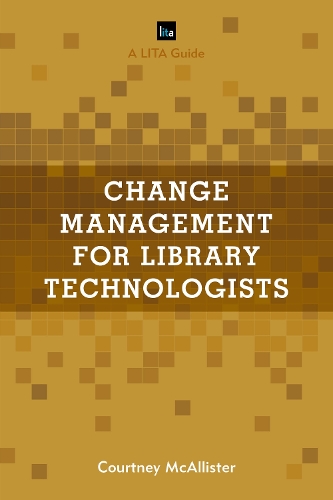
Change Management for Library Technologists: A LITA Guide
(Paperback)
Publishing Details
Change Management for Library Technologists: A LITA Guide
By (Author) Courtney McAllister
Bloomsbury Publishing PLC
Rowman & Littlefield Publishers
22nd August 2019
United States
Classifications
Professional and Scholarly
Non Fiction
025.00285
Physical Properties
Paperback
138
Width 164mm, Height 224mm, Spine 10mm
218g
Description
Technology has transformed how libraries, archives, and museums store and display their collections, engage with their users, and serve their communities. The pressure to implement new technologies is constant, but technology that isnt truly useful to users, staff, and stakeholders can represent a huge investment of time and money that yields little reward. In order to make meaningful technology changes in our libraries, archives, and museums, we need a flexible toolkit that will help information professionals become change leaders, navigating the equally complex variables associated with system specs and human experience or perception. Change management incorporates these concerns into a comprehensive framework.
Change management principles form the foundation for this books approach to managing technology change. While change will inevitably elicit unexpected situations or complications, cultivating a change management repertoire can help information professionals better identify opportunities for valuable technology change, plan and execute those changes, assess the process, and translate the experience into enriched plans for the future. Whether you have been managing library systems for decades or are an MLIS student, this book is designed to introduce you to change management principles and practical skills that you can apply to your local organizations needs.
Chapters on assessment, communication, and iterative change outline a wide range of skills that can facilitate changes like an ILS migration, makerspace launch, website re-design, or room reservation process overhaul. The condensed case studies integrated throughout the book demonstrate the breadth of technology changes taking place in the field and give first-hand accounts of triumphs and learning experiences. There is universal template that guarantees successful technology change. But a robust change management toolkit can cultivate organizational adaptability and responsiveness that empowers libraries, archives, and museums to make the most of current technology changes and positions them to embrace new ones.
Reviews
It is no surprise that technology changes pose challenges to libraries. However, it may not always be the technical details that cause the most trouble. The psychological and sociocultural shifts that technology adoption require may need just as much, if not more, consideration. This LITA guide will help library administrators understand technology change management on the human level. McAllister (electronic resources librarian at Yale's Lillian Goldman Law Library) summarizes relevant theories and models of change while maintaining a focus on helping practitioners apply the principles in a real-world setting. She situates her recommendations in the context of building an organization capable of continual learning, so that readers will learn to recognize and plan for the emotional implications of one-time technology changes and will also be reminded that iterative adaptation to those changes maybe be required in the long term. In addition to her well-written text, McAllister offers numerous brief case studies and lessons learned by librarians who have managed a technology change at their own institutions. Although intended for working librarians, the book should also prove useful to IT managers and students of library science, business management, human resources, and organizational learning.
Summing Up: Recommended. Graduate students and professionals.
This is an incredibly useful book. For anyone whos ever had to manage organizational change of any kind, it should be considered axiomatic that people will react in wildly different ways. This book addresses one of the missing issues in discussions of technological change in libraries, which is finding the most effective ways to manage the unpredictable yet universal human reactions to that change. Courtney McAllister does an excellent job describing not only how change affects people, but also what to do about it. If you manage people, you know that you must manage their full range of emotions, while also guiding them through the various stages of acceptance. This book should help library managers navigate individual and group reactions to technology change both in theoretical and practical ways. -- Andrew Weiss, Digital Services Librarian, California State University, Northridge
Courtney McAllister's book, Change Management for Library Technologists: A LITA Guide is a practical, must-read for every librarian who is managing change. Her insights and possible solutions can help organizations struggling with change, whether its existing upgrading technology, implementing new technology or projects, or modernizing the library. Her book will help project managers understand how to manage change with staff as part of any change. -- Diana Silveira, Author of Library Technology Planning for Today and Tomorrow
Serving our communities in libraries requires continuous change and adaptation. Change Management for Library Technologists provides a road map for navigating the human side of creating change in libraries. Building buy in, communication, helping overcome resistance, it's all in here. Whether you directly manage technology or not, this book gives you the tools to cultivate a culture of change. -- Lauren Comito, Neighborhood Library Supervisor at Brooklyn Public Library
Author Bio
Courtney McAllister is currently the electronic resources librarian at Yale Universitys Lillian Goldman Law Library, where she oversees the lifecycle of e-resources and systems. In her previous positions at The Citadel, The Military College of South Carolina she was heavily involved with many change processes, from the launch of a makerspace to a building renovation project and subsequent library-wide reorganization of departments and services. McAllister holds a B.A. from the University of Mary Washington, an M.A. from the University of Warwick, and an M.L.I.S. from the University of South Carolina: Columbia. She has researched and presented on emerging technologies, change management, assessment culture, and systems thinking. She is the Associate Editor of The Serials Librarian.
